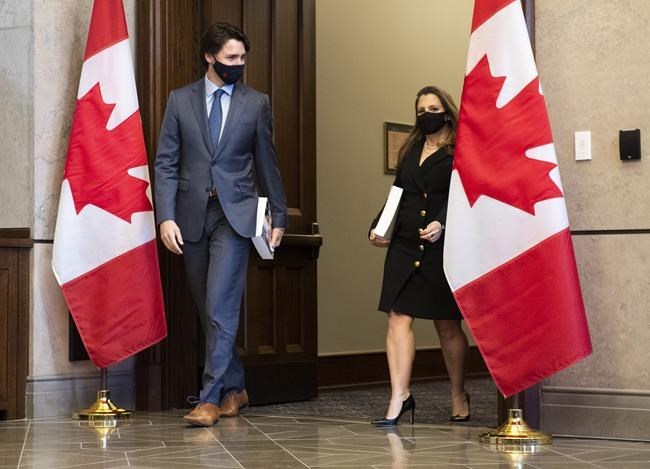OTTAWA — The Trudeau Liberals may soon start feeling the pressure to move quickly on spending and tax plans, buoyed by a more optimistic outlook for federal finances and an electorate the parties have said is eager to see more policymaking than politicking.
The Liberals are expected to release an update on the government's finances this fall that would give a renewed outlook for the deficit and an economy still affected by COVID-19.
The government may want to release the outlook in November and use it to introduce some spending and tax measures, said former parliamentary budget officer Kevin Page, who now heads the Institute of Fiscal Studies and Democracy at the University of Ottawa.
He said the need to move quickly may be a message from an electorate that returned the parties to almost their exact same standings prior to a campaign that ground policymaking to a halt.
The Liberals are unlikely to start reining in spending with the pandemic ongoing, he said, but should quickly outline the financial rules to be used to keep federal finances sustainable.
"There are some big issues out there — could be First Nations, could be housing, or could be dealing with health issues post-pandemic — where the bills are just enormous," Page said. "You can't do everything, so you would force decisions on certain things."
The current parliamentary budget officer in mid-August projected the deficit this fiscal year to be $138.2 billion, down from the $154.7 billion the government unveiled in the spring budget.
Deficits are expected to fall thereafter as pandemic spending winds down and tax revenues grow as the economy recovers, with the caveat that projections were subject to the whims of COVID-19.
"Layering on Liberal platform commitments would not substantially change this picture, but spending pressures in a coalition-context and structural pressures over the medium term warrant monitoring," Rebekah Young, Scotiabank director of fiscal and provincial economics, wrote in a post-election analysis.
The Liberals will have to gain enough opposition support to get their agenda through Parliament.
The party's platform outlined about $78 billion in new spending over five years, and hoped to ease the burden on the federal treasury by raking in $25 billion in new tax measures.
The Liberals are likely to move quickly on some of those tax measures, similar to 2015 when the newly elected raised taxes on top income earners, said Elliot Hughes of Summa Strategies.
He said details of big spending priorities, such as housing and climate change, may wait until a budget, given the short lead-time to pull together an economic update that governments sometimes use as mini-budgets.
"The sequencing of each of those very, very large spends will be interesting," said Hughes, a one-time adviser to former finance minister Bill Morneau. "And matching that on the other side of the ledger is how do they, and when do they, begin trying to raise some revenues as well?"
Toby Sanger, executive director of Canadians for Tax Fairness, said the Liberals should find willing political partners for some new tax measures because of overlapping promises made across all party platforms.
He cited overlapping promises to tax multi-national e-commerce companies, reel in revenue from excess profits from large corporations and banks, extreme-wealth taxes, as well as tax measures to reduce real estate speculation.
"They may not be exactly the same proposals, and some may be stronger than others, but they really do point to some common interest in these areas," Sanger said.
This report by The Canadian Press was first published Sept. 22, 2021.
Jordan Press, The Canadian Press



